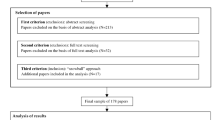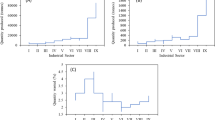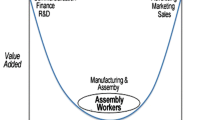Abstract
Food production and consumption is one of the major causes of global environmental degradation. One way to address environmental impacts in the food and beverage (F&B) sector is via the adoption of environmental management systems (EMS). To date, EMS research has focused predominantly on countries and sectors based in the Global North despite growing recognition of the global extent of environmental impacts from food production and consumption. In order to widen our knowledge of this topic in an under-researched emerging economy, this study examined factors determining EMS adoption within the Malaysian F&B industry. Drawn from a survey of 42 companies, this research investigated the drivers, barriers, and incentives to the adoption of the internationally recognized standard, ISO 14001. Discrepancies between the perceptions of small- and medium-sized enterprises and large companies’ as well as different product market groups were observed. It was found that large companies tend to have better understanding of the EMS concept and the enhancement of company image and improvement of environmental performance were the main drivers to implement EMS. High implementation costs and the lack of knowledge on the ISO 14001 standard were identified as the primary barriers to EMS adoption. Tax relief for certified companies and training and capacity building were considered as the most important incentives. Strategies were proposed to improve the environmental performance of Malaysian F&B companies which can strengthen the competitiveness of Malaysian F&B products in the global food market.








Similar content being viewed by others
Notes
SME Corporation Malaysia (2015) defines small and medium enterprises within manufacturing sector as an establishment which has a sales turnover no more than RM 50 million or full-time employees not exceeding 200 workers.
Following a study by Nishitani (2010), the export ratio is calculated as the value of export (in million MYR) divided by the Malaysian GDP.
References
Adham KN, Merle K, Weihs G (2013) Sustainable consumption and production in Malaysia: a baseline study of government policies, institutions and practices. Economic Planning Unit, Prime Minister’s Department, Putrajaya
Arimura TH, Darnall N, Katayama H (2011) Is ISO 14001 a gateway to more advanced voluntary action? The case of green supply chain management. J Environ Econ Manage 61:170–182. doi:10.1016/j.jeem.2010.11.003
AHK Malaysia (2012) Market watch 2012: the Malaysian food industry. Malaysia-German Chamber of Commerce and Industry. www.malaysia.ahk.de/en/services/market-entry/market-information/food-sector/. Accessed 3 Jan 2017
Bellesi F, Lehrer D, Tal A (2005) Comparative advantage: the impact of ISO 14001 environmental certification on exports. Environ Sci Technol 39:1943–1953. doi:10.1021/es0497983
Bentley M (2008) Planning for change: guidelines for national programmes on sustainable consumption and production. United Nations Environment Programme, Paris
Boiral O, Guillaumie L, Heras-Saizarbitoria I, Tene CVT (2017) Adoption and outcomes of ISO 14001: a systematic review. Int J Manage Rev. doi:10.1111/ijmr.12139
Brammer S, Hoejmose S, Marchant K (2012) Environmental management in SMEs in the UK: practices, pressures and perceived benefits. Bus Strat Environ 21:423–434. doi:10.1002/bse.717
Campos LM (2012) Environmental management systems (EMS) for small companies: a study in Southern Brazil. J Clean Prod 32:141–148. doi:10.1016/j.jclepro.2012.03.029
Delmas M, Toffel M (2004) Stakeholders and environmental management practices: an institutional framework. Bus Strat Environ 21:423–434. doi:10.1002/bse.717
DOSM (2017) External trade. Department of Statistics Malaysia. www.dosm.gov.my. Accessed 10 June 2017
Eco-Action 21 (2017) What is eco action 21? Institute for Promoting Sustainable Societies. www.ea21.jp/ea21/index.html. Accessed 9 June 2017
European Commission (2008) Communication from the Commission to the European Parliament, The Council, The European economic and social committee and the committee of the regions on the sustainable consumption and production and sustainable industrial policy action plan. eur-lex.europa.eu/legal-content/. Accessed 13 Feb 2017
European Commission (2017) Eurostat. epp.eurostat.ec.europa.eu/newxtweb/. Accessed 10 June 2017
Fan J, Zhao D, Wu Y, Wei J (2014) Carbon pricing and electricity market reforms in China. Clean Technol Environ 16:921–933. doi:10.1007/s10098-013-0691-6
Fryxell GE, Szeto A (2002) The influence of motivations for seeking ISO 14001 certification: an empirical study of ISO 14001 certified facilities in Hong Kong. J Environ Manage 65:223–238. doi:10.1006/jema.2001.0538
Garnett T (2008) Cooking up a storm: food, greenhouse gas emissions and our changing climate. Food Climate Research Network, Guildford
Goh YN, Wahid NA (2015) A review on green purchase behaviour trend of Malaysian consumers. Asian Soc Sci 11:103–110. doi:10.5539/ass.v11n2p103
Gualandris J, Klassen RD, Vachon S, Kalchschmidt M (2015) Sustainable evaluation and verification in supply chains: aligning and leveraging accountability to stakeholders. J Oper Manage 38:1–13. doi:10.1016/j.jom.2015.06.002
ISO (2016) ISO survey 2015. International Organization for Standardization. www.iso.org/iso/iso-survey. Accessed 2 Jan 2017
Jiang RJ, Bansal P (2003) Seeing the need for ISO 14001. J Manage Stud 40:1047–1067. doi:10.1111/1467-6486.00370
Jones N, Panoriou E, Thiveou K, Roumeliotis S, Allan S, Clark JRA, Evangelinos KI (2012) Investigating benefits from the implementation of environmental management systems in a Greek university. Clean Technol Environ 14:669–676. doi:10.1007/s10098-011-0431-8
KPMG Environmental Consulting (1997) The environmental challenge and small and medium-sized enterprises in Europe. KPMG Environmental Consulting, The Hague
Lee CT, Klemeš JJ, Hashim H, Ho CS (2016) Mobilising the potential towards low-carbon emissions society in Asia. Clean Technol Environ 18:2337–2345. doi:10.1007/s10098-016-1288-7
Lewis KV, Cassells S, Roxas H (2015) SMEs and the potential for a collaborative path to environmental responsibility. Bus Strat Environ 24:750–764. doi:10.1002/bse.1843
Liu X, Klemeš JJ, Varbanov PS, Čuček L, Qian Y (2016) Virtual carbon and water flows embodied in international trade: a review on consumption-based analysis. J Clean Prod 146:20–28. doi:10.1016/j.jclepro.2016.03.129
Ludema RD, Wooton I (1994) Cross-border externalities and trade liberalization: the strategic control of pollution. Can J Econ 27:950–966. doi:10.2307/136193
Majumdar SK, Marcus AA (2001) Rules versus discretion: the productivity consequences of flexible regulation. Acad Manage J 44:170–179. doi:10.2307/3069344
Manzo K, Padfield R (2016) Palm oil not polar bears: climate change and development in Malaysian media. Trans Inst Br Geogr 41:460–476. doi:10.1111/tran.12129
Massoud MA, Fayad R, El-Fadel M, Kamleh R (2010) Drivers, barriers and incentives to implementing environmental management systems in the food industry: a case of Lebanon. J Clean Prod 18:200–209. doi:10.1016/j.jclepro.2009.09.022
McKeiver C, Gadenne D (2005) Environmental management systems in small and medium businesses. Int Small Bus J 23:513–537. doi:10.1177/0266242605055910
MIDA (2013) Food industry in Malaysia. Malaysian Investment Development Authority. www.mida.gov.my/home/food-technology-and-sustainable-resources/posts/. Accessed 31 May 2016
Neumayer E, Perkins R (2004) What explains the uneven take-up of ISO 14001 at the global level? A panel-data analysis. Environ Plan A 36:823–839. doi:10.1068/a36144
Nikolaou I, Evangelinos KI, Emmanouil D, Leal W (2012) Voluntary versus mandatory EMS implementation: management awareness in EMS-certified firms. Asia Pac J Manage 8:1–12. doi:10.1177/2319510X1200800102
Nishitani K (2010) Demand for ISO 14001 adoption in the global supply chain: an empirical analysis focusing on environmentally conscious markets. Resour Energy Econ 32:395–407. doi:10.1016/j.reseneeco.2009.11.002
NSWMD (2013) Survey on solid waste composition, characteristics & existing practice of solid waste recycling in Malaysia. National Solid Waste Management Department. jpspn.kpkt.gov.my/index.php/pages/view/66. Accessed 23 Jan 2017
OECD (2014) Towards green growth in Southeast Asia. OECD Green Growth Stud. doi:10.1787/9789264224100-en
Padfield R, Papargyropoulou E, Preece C (2012) A preliminary assessment of greenhouse gas emission trends in the production and consumption of food in Malaysia. Int J Technol 3:55–66. doi:10.14716/ijtech.v3i1.81
Papargyropoulou E, Padfield R, Harrison O, Preece C (2012) The rise of sustainability services for the built environment in Malaysia. Sustain Cities Soc 5:44–51. doi:10.1016/j.scs.2012.05.008
Papargyropoulou E, Lozano R, Steinberger JK, Wright N, bin Ujang Z (2014) The food waste hierarchy as a framework for the management of food surplus and food waste. J Clean Prod 76:106–115. doi:10.1016/j.jclepro.2014.04.020
Papargyropoulou E, Wright N, Lozano R, Steinberger J, Padfield R, Ujang Z (2016) Conceptual framework for the study of food waste generation and prevention in the hospitality sector. Waste Manag 49:326–336. doi:10.1016/j.wasman.2016.01.017
Prajogo D, McDermott CM (2014) Antecedents of service innovation in SMEs: comparing the effects of external and internal factors. J Small Bus Manage 52:521–540. doi:10.1111/jsbm.12047
Prakash A, Potoski M (2006) Racing to the bottom? Trade, environmental governance, and ISO 14001. Am J Polit Sci 50:350–364. doi:10.1111/j.1540-5907.2006.00188.x
Qi GY, Zeng SX, Tam CM, Yin HT, Wu JF, Dai ZH (2011) Diffusion of ISO 14001 environmental management systems in China: rethinking on stakeholders’ roles. J Clean Prod 19:1250–1256. doi:10.1016/j.jclepro.2011.03.006
Quazi HA, Khoo YK, Tan CM, Wong PS (2001) Motivation for ISO 14000 certification: development of a predictive model. Omega 29:522–542. doi:10.1016/S0305-0483(01)00042-1
Salim H, Padfield R, Hansen SB, Ali Y, Mohamad S, Syayuti K, Tham M, Papargyropoulou E (2017) Global trends in environmental management systems and ISO14001 research. J Clean Prod. doi:10.1016/j.jclepro.2017.09.017
Searchinger T, Hanson C, Ranganathan J, Lipinski B, Waite R, Winterbottom R, Dinshaw A, Heimlich R (2013) Creating a sustainable food future: interim findings. www.wri.org. Accessed 5 Sept 2017
SME Corporation Malaysia (2015) SME definitions. www.smecorp.gov.my. Accessed 29 Jan 2017
Staniškis J, Arbačiauskas V, Varžinskas V (2012) Sustainable consumption and production as a system: experience in Lithuania. Clean Technol Environ. doi:10.1007/s10098-012-0509-y
Steger U (2000) Environmental management systems: empirical evidence and further perspectives. Eur Manage J 18:23–27. doi:10.1016/S0263-2373(99)00066-3
Studer S, Welford R, Hills P (2006) Engaging Hong Kong businesses in environmental change: drivers and barriers. Bus Strat Environ 15:416–431. doi:10.1002/bse.516
Studer S, Tsang S, Welford R, Hills P (2008) SMEs and voluntary environmental initiatives: a study of stakeholders’ perspectives in Hong Kong. J Environ Plan Manage 51:285–301. doi:10.1080/09640560701865073
Tan LP (2005) Implementing ISO 14001: is it beneficial for firms in newly industrialized Malaysia? J Clean Prod 13:397–404. doi:10.1016/j.jclepro.2003.12.002
Todorov V, Filzmoser P (2010) Robust statistic for the one-way MANOVA. Comput Stat Data Anal 54:37–48. doi:10.1016/j.csda.2009.08.015
Turk AM (2009) The benefits associated with ISO 14001 certification for construction firms: Turkish case. J Clean Prod 17:559–569. doi:10.1016/j.jclepro.2008.11.001
UNEP (2012) Global outlook on SCP policies: taking action together. United Nations Environment Programme. Sustainabledevelopment.un.org. Accessed 4 Feb 2017
Zeng SX, Tam CM, Tam VW, Deng ZM (2005) Towards implementation of ISO 14001 environmental management systems in selected industries in China. J Clean Prod 13:645–656. doi:10.1016/j.jclepro.2003.12.009
Acknowledgements
An earlier version of this paper was presented at the 2nd International Conference of Low Carbon Asia & Beyond in Kuala Lumpur, Malaysia. The first author would like to acknowledge Malaysia-Japan International Institute of Technology (MJIIT), Universiti Teknologi Malaysia (UTM), for the financial support under the Japan-ASEAN Integration Fund (JAIF) Master scholarship (Vot No: A.k430000.6100.08997). The second author would like to acknowledge Universiti Teknologi Malaysia (UTM) for funding this research under the Foreigner Lecturer’s research grant (Vot No: 4D015). A final acknowledgement is also made to Dr. May A. Massoud for her valuable contribution to this research.
Author information
Authors and Affiliations
Corresponding author
Ethics declarations
Conflict of interest
The authors declare that they have no conflict of interest.
Rights and permissions
About this article
Cite this article
Salim, H.K., Padfield, R., Lee, C.T. et al. An investigation of the drivers, barriers, and incentives for environmental management systems in the Malaysian food and beverage industry. Clean Techn Environ Policy 20, 529–538 (2018). https://doi.org/10.1007/s10098-017-1436-8
Received:
Accepted:
Published:
Issue Date:
DOI: https://doi.org/10.1007/s10098-017-1436-8




